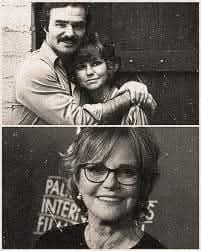Sally Field once wrote in her 2018 memoir In Pieces about a relationship that, over time, made her lose sight of herself. She was talking about Burt Reynolds — her Smokey and the Bandit co-star and the man who, for years, called her the love of his life. In the late ’70s and early ’80s, they looked like one of Hollywood’s most glamorous couples. But behind the smiles and the red carpets, things were far more complicated.
Sally had already been through a difficult childhood and carried the weight of old wounds when she met Burt. In the beginning, he made her feel special. His charm, confidence, and humor swept her up quickly. But as the years went by, the warmth she first felt began to turn into something more controlling. His love often came with conditions, and she found herself bending, changing, and shrinking parts of who she was to fit into his idea of the “perfect” partner.
Burt’s influence didn’t stop at their personal life — it spilled into her career. He liked to be in charge, and when she was offered challenging, career-changing roles, he would discourage her or show little enthusiasm if the projects didn’t serve his own vision. When she went after her Norma Rae role on her own — the one that would win her an Oscar — she didn’t have his support. Instead of celebrating with her, he pulled away, turning what should have been a joyful milestone into a lonely moment.
Over time, Sally began to silence parts of herself. She had always been thoughtful and deeply in touch with her emotions, but Burt often brushed off her feelings as overthinking. If she opened up about doubts, he’d meet her with sarcasm. If she cried, he’d shut down. Slowly, she learned to believe her emotions were a burden, carrying that belief into her work, friendships, and self-image.
In public, though, the picture looked perfect. Burt was a box-office star and a sex symbol, and he enjoyed the attention their relationship brought. He would speak about their love with grand gestures and romantic words, but Sally often felt like she was playing a part — not just in their movies, but in their life together. The line between who she really was and who he wanted her to be kept getting blurrier.
It wasn’t until they spent time apart that she began to see the truth more clearly. In those moments away from him, she felt calmer, lighter, more herself. She started writing in her journal, going to therapy, and reconnecting with her own dreams and voice. Only then did she realize how emotionally isolating the relationship had been.
When Burt told Vanity Fair in 2015 that she was the greatest love of his life, Sally responded with kindness but didn’t back away from her truth. She explained that their love had cost her more than it gave — that she had never felt fully loved for who she was, only for what she could offer him emotionally.
Leaving Burt marked a turning point. She stopped making compromises that silenced her creativity and began taking roles that reflected strong, layered women — characters who spoke up, made their own choices, and didn’t shrink for anyone. Films like Places in the Heart and Steel Magnolias became reflections of her own transformation.
When Burt died in 2018, Sally spoke through People magazine, acknowledging their shared past without pretending it was something it wasn’t. Her words carried compassion, but also clarity. By then, she had taken back the authorship of her own life.
Walking away from him wasn’t the end — it was the start of a new chapter. And in choosing herself, Sally made the most powerful statement of self-worth she ever could.✍️
